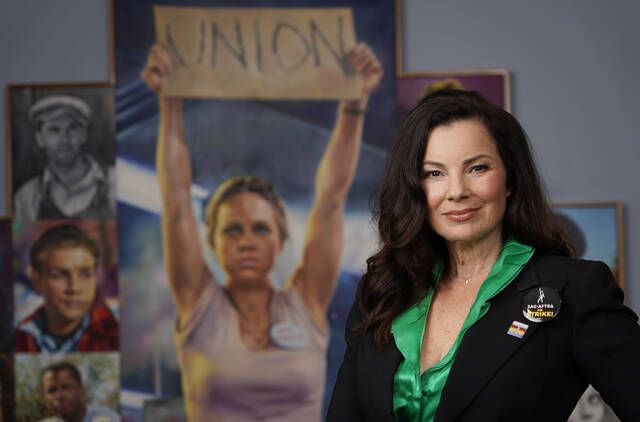LOS ANGELES — Fran Drescher believes that the walkouts that have shut down Hollywood are about something much bigger than the actors union she leads, or the writers striking alongside them, or the entertainment industry.
Drescher told The Associated Press the moment is about the entire world of work, and a larger stand against corporate leaders who value shareholders over the people who create their product.
“At some point you have to say no more,” Drescher, the former “Nanny” star who is now president of the Screen Actors Guild-American Federation of Television and Radio Artists, said in an interview at the union’s headquarters Wednesday. “I think that it’s taken on a bigger scope, it’s greater than the sum of its parts. I think it’s a conversation now about the culture of big business, and how it treats everybody up and down the ladder in the name of profit.”
Drescher, 65, has been president of the actors guild since September of 2021, when she defeated “Stranger Things” actor Matthew Modine in a union election.
But for many members and observers, the day she truly became president was July 13, when Drescher gave a rousing, fiery and for some inspiring speech at the news conference announcing that talks had broken off and a strike was about to begin.
She lashed out at the leaders of the studios and streaming services, saying “Shame on them. They stand on the wrong side of history.”
Drescher told the AP that she had no intention of getting on a soap box that day. She was supposed to read a written statement, then take questions.
“I looked at it quickly and I said, ‘You know what, I can’t say this, I really feel like I have to speak from the heart,’” she said. “That just kind of came out of my mouth, and I’m glad that I was able to express myself as succinctly and sincerely and authentically as I did. And I think that it’s fascinating when you speak from the heart, people are so responsive. Because I guess they see a lot of people that don’t.”
Drescher is the first president of the guild to preside over a film and TV actors strike since 1980. At the time, only one woman had led the union. Now, seven have, including three of the past five.
The Screen Actors Guild (it merged with AFTRA in 2012) has had plenty of famous presidents, from James Cagney to Ronald Reagan to Charlton Heston.
But few in recent decades have had as recognizable a name, face, voice or laugh as Drescher. She made her film debut with a tiny part in the 1977 John Travolta disco classic “Saturday Night Fever,” and after many similar small but memorable roles, nearly always as brash New Yorkers, she starred for six seasons on the sitcom “The Nanny” from 1993 to 1999.
On the show, which she co-created, Drescher played Fran Fine, a character who becomes a children’s caretaker for an upper-crust Manhattan family. The similarities between her character and herself went beyond her name: born and raised in Queens, New York, frank to a fault, and punctuating sentences with a nasal giggle.
She said the business has changed vastly since then.
“I’m very grateful that I got my big break during that time and not this time,” Drescher said. “When I started on ‘The Nanny’ at CBS, that was still a family owned business. You knew who the owners were and you could talk to them. And everything has changed.”
In a very different caretaking role today, she has a very different view.
“Now, when you have a business model where the CEOs are more connected to the shareholders and not to the people that actually make the product that they’re selling,” she said. “I think that you have a breakdown that is unsustainable.”
The Alliance of Motion Picture and Television Producers, the group representing the employers, recently restarted talks with the Writers Guild of America, whose members have been on strike for nearly four months. The negotiations have yielded little. Drescher says the AMPTP has yet to reach out to SAG-AFTRA leadership about resuming talks.
“I’m not really understanding what the silent treatment is,” Drescher said. “It could be a tactical strategy to see if we they can wait us out until we lose our resolve and then they can make a better deal for themselves.”
Drescher said nothing like that is going to happen.
“This is an inflection point,” she said. “I don’t think anybody that’s in charge of the AMPTP quite understands that. “This is not like any past negotiation. We’re in a whole new ball game. And if things don’t change radically, quite frankly, I think that they’re going to ultimately get very hurt by this strike.”




